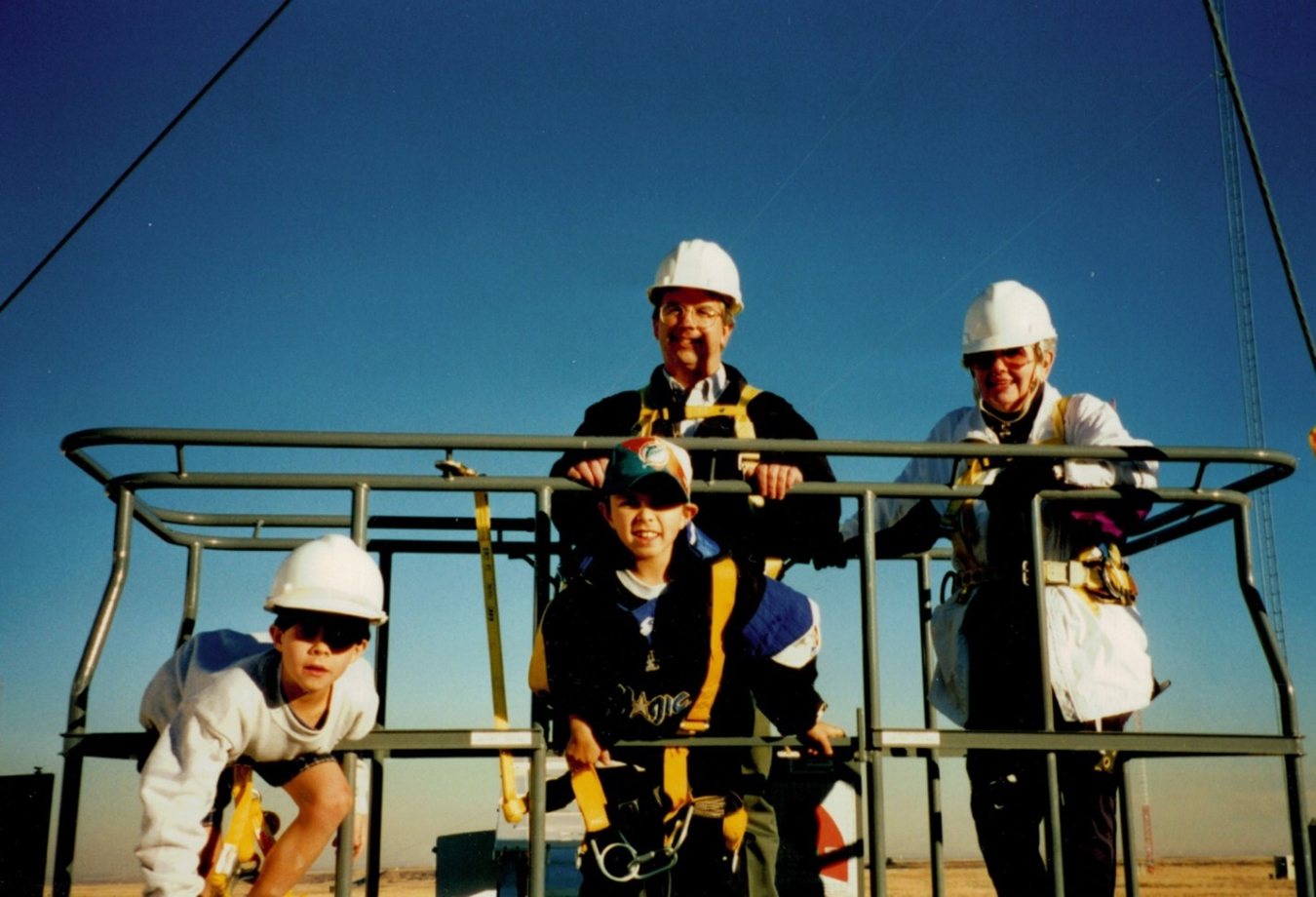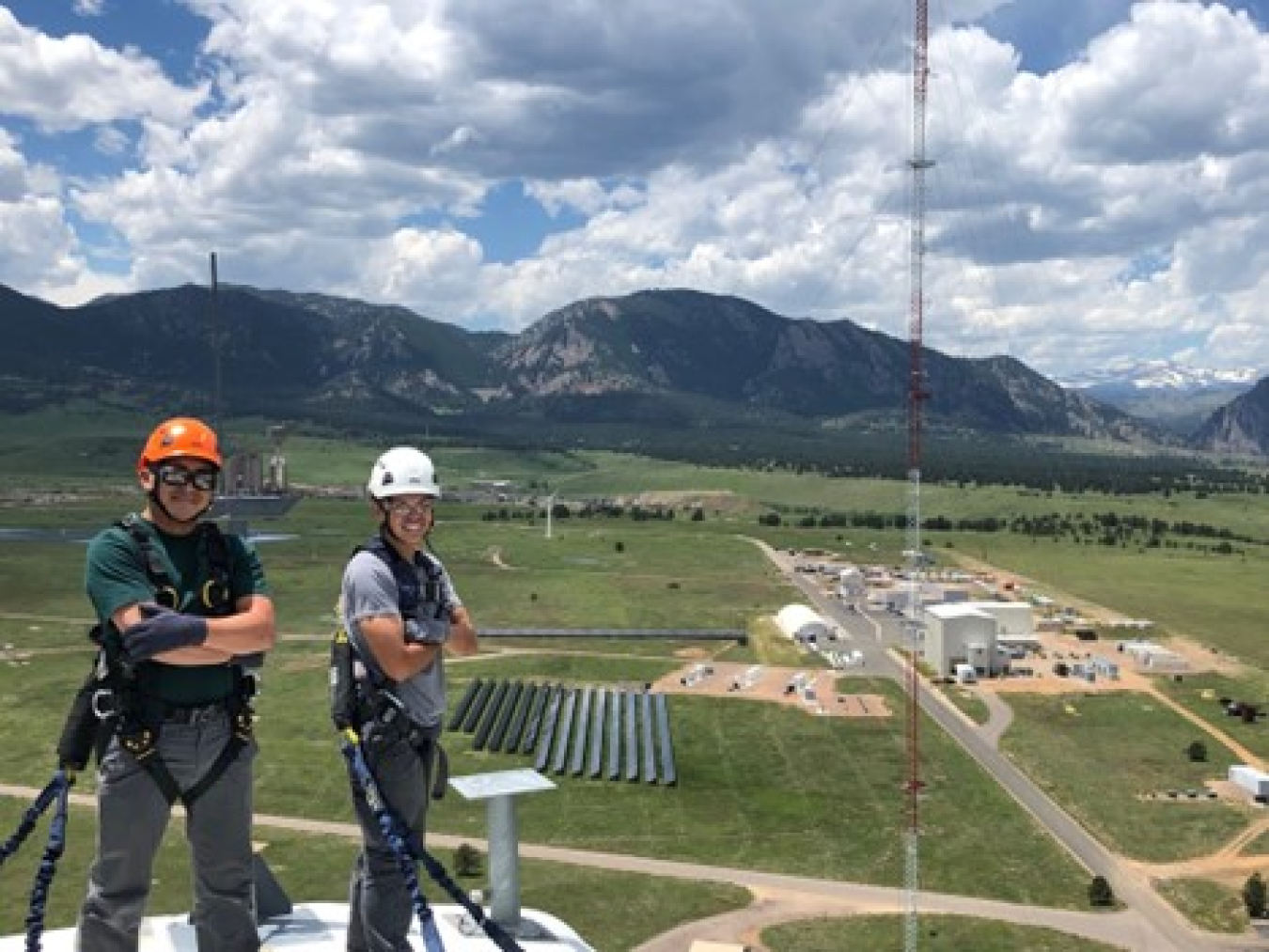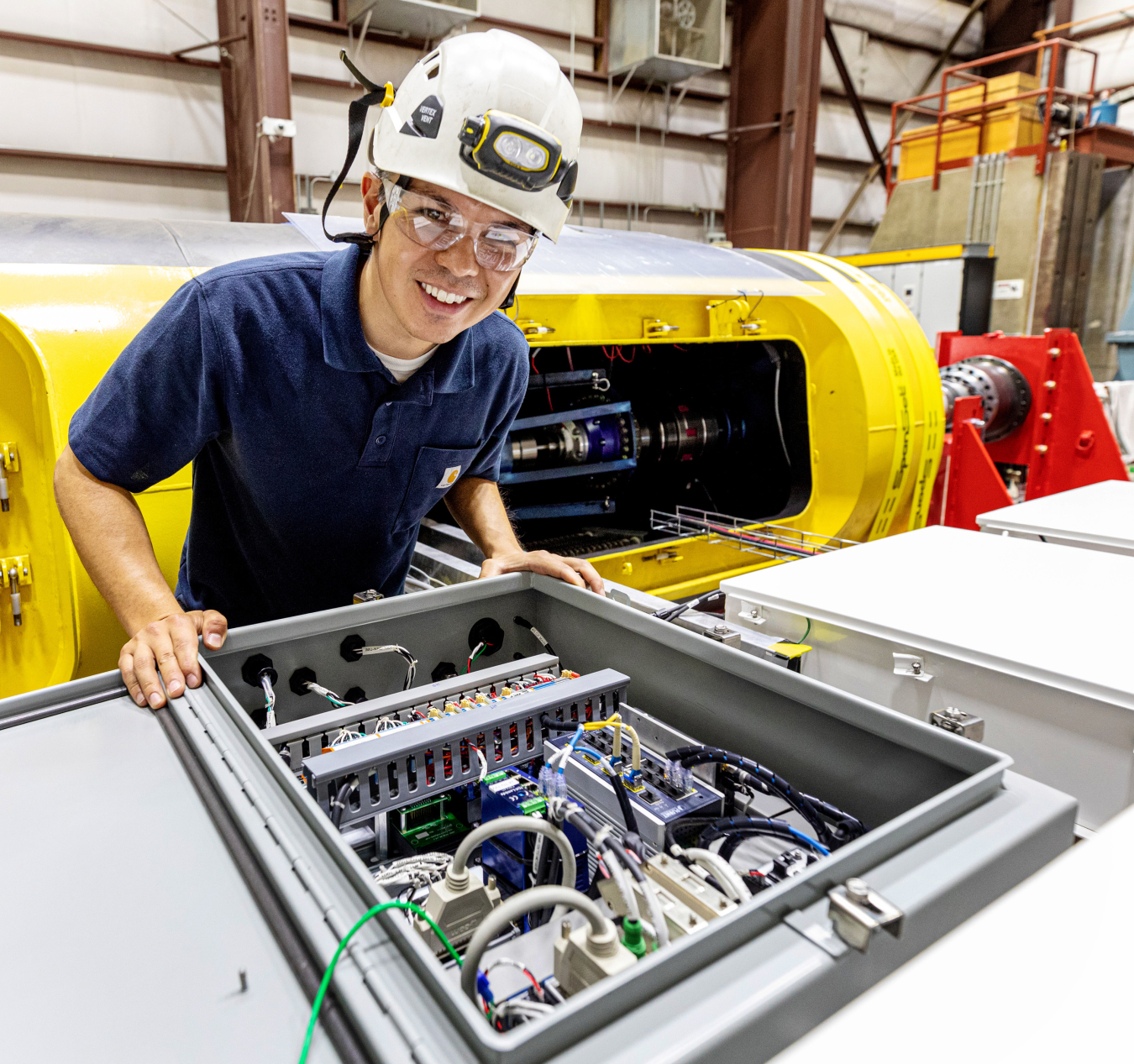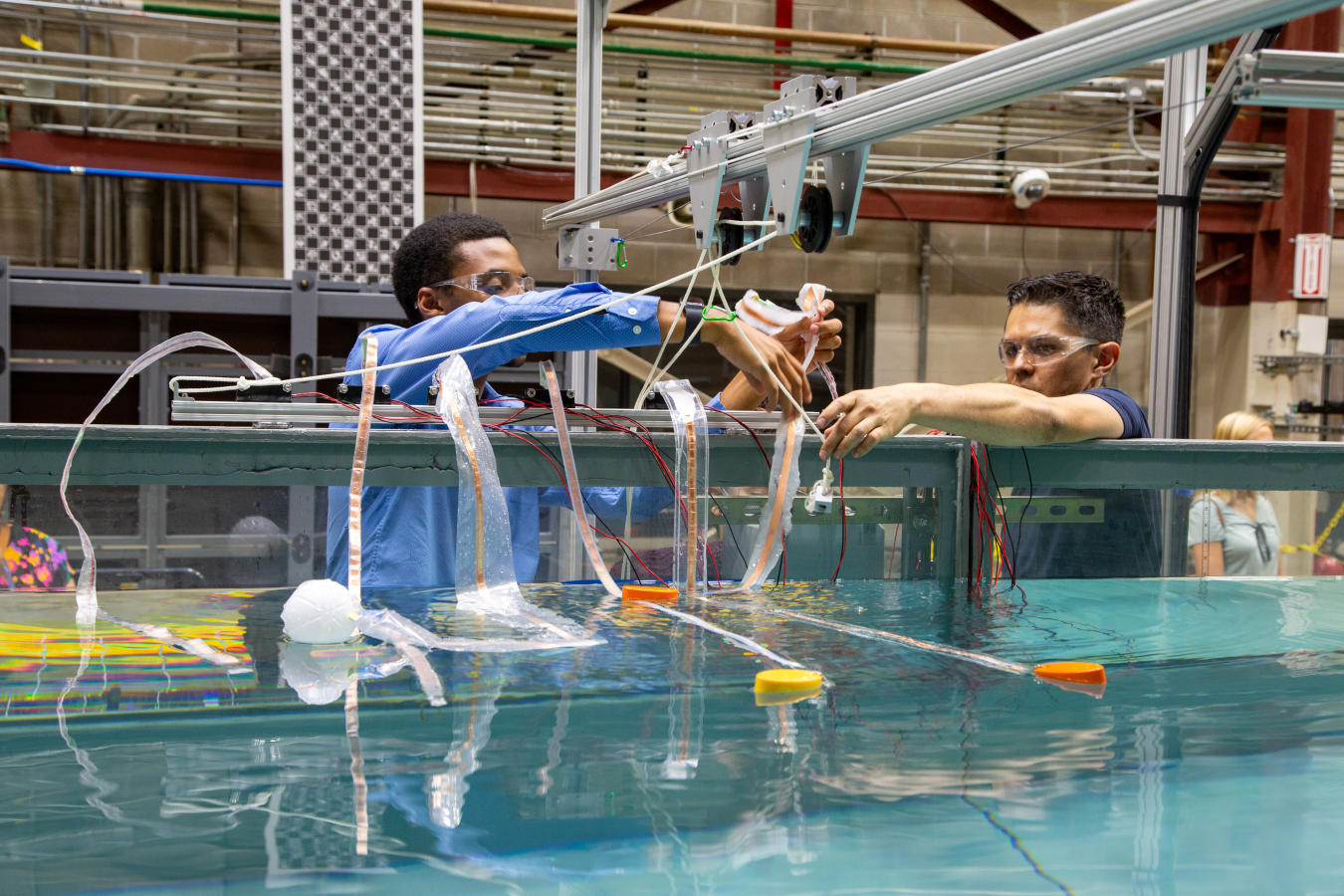Andrew Simms, a researcher at National Renewable Energy Laboratory, discusses how a childhood experience, his father’s influence, and his quest to find a sense of purpose led him to a career path where he is searching for the “big answer” in wave energy.
Water Power Technologies Office
May 2, 2024The first time Andrew Simms visited the National Renewable Energy Laboratory (NREL), he was 9 years old, tagging along behind his dad, Dave Simms, an engineer who worked at the lab for 43 years. His dad took him up the experimental wind turbine. At the top, Simms blinked in an exclusive view of Colorado’s Front Range mountains while the winds whipped his hair like prairie grass.

For many kids, this kind of magical experience burrows deep. It’s often the moment they decide, “This is my future.” But not for Simms.
“If you asked me when I was maybe 12 years old, I would probably have told you I wanted to be a stockbroker,” Simms said.
It wasn’t until Simms studied finance as an undergraduate that doubts started to shake his stock dream. Ultimately, his mind slipped back to his dad and those giant wind turbines.
“Growing up, it was nice to know my dad was doing something good in the world,” Simms said. “But I didn’t think I would follow in his footsteps.”
And yet, that’s exactly what he’s doing.
Simms ended up joining NREL in 2019 as a wind energy research technician, and now he’s climbed the big wind turbine countless times.
Within a year of starting at NREL, he switched his focus to marine energy—energy generated from powerful waves, tides, and ocean and river currents—and discovered this nascent field had way more unanswered questions than he expected. “Wave energy is one of the last great frontiers for renewable energy,” Simms said. “There’s an immense amount of energy in ocean waves and currents. All we have to do is find a way to extract that energy.”

In 2021, Simms decided he wanted to help search for that big answer. So, he returned to school to earn a degree in data science. Now, he culls clues from complicated but incredibly valuable data to help advance those marine energy prototypes. And he feels that, like his dad, he’s doing something good in the world.
Simms shared what it’s like to follow in his dad’s footsteps, how his studies align with his current work, and what advice he has for someone considering a career change.
-
Ripple Effect
WPTO’s Ripple Effect series features individuals whose impactful work will help advance hydropower and marine energy technologies to achieve a clean energy future.
How did you end up switching from finance to renewable energy?
It was a long journey. I applied for a lot of finance jobs, but nothing worked out. In finance, I didn’t feel that I would be contributing to the greater good. For me, making money, meeting quarterly deadlines, and trying to maximize stakeholder value wasn’t how I wanted to spend my time. At NREL, we have room to dream big about global problems.
What was it like to follow in your dad’s footsteps?
Some of the NREL technicians I work with knew me when I was a little kid. And I’ve worked with people my dad hired. I feel like I’m building on his legacy, but in a new technology area, which is pretty cool. He worked on a project that studied how well wind turbine models match real-world testing, and they learned a lot of the models were incorrect.
That’s one of the things I see in wave energy. We have all these ideas and models, but we don't have a lot of real-world data to verify them yet. The problem is really complex: Trying to collect data in the field that’s associated with what you’re seeing in the lab is a serious challenge. I can envision our team working toward a project like my dad’s but for wave and tidal energy.
What were your first official days and weeks at NREL like?
They were awesome. Before NREL, I worked for an app startup. One of my friends was the co-founder and needed someone with a software development background. But I got really burned out. It was hard, a lot of hours, and I was frazzled. I felt like I needed a breath of fresh air.
In business school, I learned about corporate social responsibility—the idea that businesses should take responsibility for their impact on society and the environment. NREL lives and breathes that kind of mission, so I knew working there would give me a sense of purpose. My dad suggested I apply for the technician job because it could “change my perspective on the world,” as he put it.
Obviously, you got the job.
I did and in my third week I had the privilege of climbing up one of the wind turbines. It was hard but so much fun. I knew I’d have to learn very different skills. I worked a few construction jobs growing up and was always taking things apart to try to figure out how they worked. I like to think my interview sold the idea that I was a hard worker. But the reality is I probably just lucked out; there were not many applicants.

What was the first sign that you wanted to switch roles from technician to data scientist?
I loved being a technician, working with my hands, and building things. It taught me to be a craftsman. Our team built complex electrical systems to collect data on or control marine energy prototypes. I loved making sure all the cables and instrumentation were built properly, but I always wanted to make sure they worked properly. That required a different skill set.
My manager said, “If you want to analyze data, you’re going to have to earn it.” The next month, I figured out how to get into the University of Colorado Boulder for a Master of Science in Data Science and try to earn my position.
Wow. How’s that going so far?
I’m not finished with my degree yet. But I moved into a researcher position and am already analyzing data for a wave energy project for which I built some of the data collection systems.
Data science requires multidisciplinary skills. At first, getting a handle on everything felt frustrating. The problems can feel overwhelming. Luckily, I have a great team that is willing to teach me. In one of my classes, I learned that researchers used to come up with hypotheses and then collect data targeted to them. Now data is easier to collect, so you collect a bunch and then come up with a hypothesis to test. As a technician, I had no idea why we were collecting the data. But now, I’ll get a dataset on a wave energy converter and have to search for answers. It’s crazy how much my classes match my current work. I don’t think I would care about school as much if I didn’t have the work to motivate me.
Are you working on any projects now that are especially exciting?
They’re all exciting! I focus on two areas: collaboratively building tools for marine energy data analysis and data validation and standardization. For example, I work on the Marine and Hydrokinetic Toolkit, or MHKiT, which is a free, open-source tool that marine energy companies and labs can use to collect and analyze data. Our goal is to make it as fast and painless as possible for users to access data on how much energy exists in different potential deployment sites and understand how a device design might perform in those sites.
I’m also analyzing data collected during the most recent deployment of a wave-powered water desalination device, so the team can continue to improve the design.

In an ideal world, what would you most hope to accomplish over the course of your career?
Ultimately, I’d love to see marine energy make an impact on the world. If we collaboratively put in a lot of effort, try to understand day-to-day what we can do to move things forward and what questions we need to tackle, we will succeed in getting marine energy technologies to market.
What advice do you have for people who might want to make a similar career pivot and go back to school or try to learn something new?
Find something you like to do! Work hard but don’t try to do it all at once. Be willing to collaborate. There were technicians who were way harder workers than I was, which motivated me. I wanted to catch up. There is a lot to learn, but I’m not afraid to put in the work. I have to train harder, work harder, so I can help my team and the world.
Catch up on the Water Power Technologies Office’s (WPTO’s) other Ripple Effect profiles and the Office of Energy Efficiency and Renewable Energy’s Clean Energy Champions.
And stay in the know with WPTO! Receive the latest information on WPTO funding opportunities, events, and other news by subscribing to the bimonthly Hydro Headlines and Water Column newsletters, as well as the comprehensive, monthly Water Wire newsletter.

